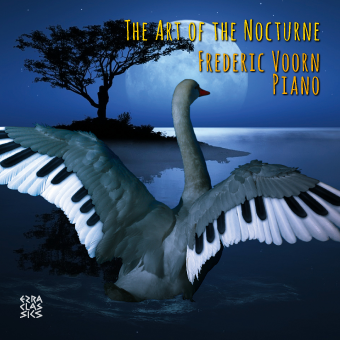The Art of the Nocturne is an anthology of this genre of the night. The Nocturne was introduced as a piano piece by John Field and made famous by Frédéric Chopin. Field lived for a long time in Saint-Petersburg and there he influenced several Russian composers. Chopin lived in Parijs and influenced the French. On this CD there are nocturnes played by Field and Chopin, and also by six Russian and six French composers.
The Art of the Nocturne can be purchaced in EU countries for € 17,– (international postage included). If you send this amount with your name and address to IBAN nr. NL50INGB0000188367, (swift code = Bic INGBNL2A) attention to F.T.C.G. Voorn, we will mail you the CD as soon as possible. If you are in a non-euro country, you can pay by paypal. Please send us a mail for further details.
The Art of the Nocturnes play list:
1 Chopin Nocturne in E-flat major op. 55 # 2 (1844)
2 Field Nocturne in B-flat major (1817)
3 Glinka Nocturne in F minor ‘La séperation’ (1839)
4 Gutmann Nocturne in A-flat major op. 8 # 1 (1844)
5 Alkan Nocturne in B major op. 22 (1844)
6 Bizet Nocturne in D major (1868)
7 Tchaikovsky Nocturne in F major op. 10 # 1 (1871)
8 Fauré Nocturne in E-flat major op. 36 (1884)
9 Debussy Nocturne in D-flat major (1892)
10 Arensky Nocturne in D-flat major op. 36 # 3 (1894)
11 Scriabin Nocturne for the left hand in D-flat major op. 9 # 2 (1894)
12 Balakirev Nocturne # 3 in D minor (1902)
13 Ropartz Nocturne # 3 in E minor (1916)
14 Katchaturian Nocturne from Masque Suite (1941)
The art of the Nocturne
The nocturne as a work for the piano was introduced in 1812 by John Field. This Irish composer (1782-1837) was one of the most important pianists of his time and well-known throughout Europe. He lived for a long time in Saint Petersburg. Field had a tragic life. In his youth he was exploited as a prodigy by his teacher Muzio Clementi (one of the few composers who died a rich man) and in later life he became an alcoholic.
Although the nocturne was introduced by Field, the genre was made famous by Frédéric Chopin (1810-1849). Field’s nocturnes, like the Nocturne in B-flat major from 1817 played here, are generally very simple pieces by nature. The Chopin nocturnes are build on a much larger scale, as can be heard in the first piece of this CD, the Nocturne in E-flat major op. 55 # 2 from 1844. Besides these two works by Field and Chopin, this disc contains nocturnes by six Russians and six Frenchmen, who were influenced by these two composers.
During his stay in Saint Petersburg, John Field gave a few piano lessons to Mikhail Glinka (1804-1857), the first important Russian composer and the founder of the Russian nationalist school. Glinka composed his Nocturne in F minor‘La séperation’ in 1839 for his sister Elisaveta, who was on a journey to Saint Petersburg. Glinka influenced a lot of other Russian composers, such as Pyotr Ilytch Tchaikovsky (1840-1893), who’s Nocturne in F major op. 10 # 1 was written in 1871, and also Mily Balakirev (1837-1910), who’s Third Nocturne in D minor from 1902 is played here. Glinka had predicted that Balakirev would become a “Second Glinka”, as both men abhored any foreign influences in Russian music. As leader of The Mighty Handful, a group of composers inspired by Russian folklore, Balakirev sharply criticized Tchaikovsky, who’s music he found much too cosmopolitan.
The Nocturne in D-flat minor op. 36 # 3 by Anton Arensky (1861-1906) was composed in 1894. From the same year is the Nocturne for the Left Hand in D-flat major op. 9 # 2 by Alexander Scriabin (1872-1915), who studied with Arensky at the Conservatory of Moscow. This one-handed piece was composed after Scriabin had strained his right hand while practising some virtuosic pieces, among them Islamey by Mily Balakirev. The last work on this CD, the Nocturne by Aram Katchaturian (1903-1978) is from his Masquerade Suite from 1941.
As it can be stated that John Field had a certain influence on Russian musical life, that of Frédéric Chopin on French composers is paramount. For a long time he lived in Paris and there he gave piano lessons to Adolf Gutmann (1819-1882), who’s Nocturne in A-flat minor op. 8 # 1 from 1844 could have been written bij Chopin himself. The Nocturne in B major op. 22 by Chopin’s good friend Charles-Valentin Alkan (1813-1888) was composed in the same year and is polyphonic by nature. The Nocturne in D major from 1868 by Georges Bizet (1838-1875) and the Nocturne in E-flat major op. 36 from 1884 by Gabriel Fauré (1845-1924) run through the whole musical spectrum of emotions and are far removed from the simple melodies by John Field. Not all nights are quiet and peacefull, they can also be quite turbulent. Also the Nocturne in D-flat major by Claude Debussy (1862-1918), written in 1892, is a monumental work with a central section that almost sounds Russian and that reminds of the summers that Debussy spend as a house pianist in the service of Madame von Meck, the patroness of Tchaikovsky. The Third Nocturne in E minor by Guy Ropartz (1864-1955) was composed in 1916 and is based on a poem by Jean Moréas, dedicated to the sea.
Ezra Classics EC 040499
